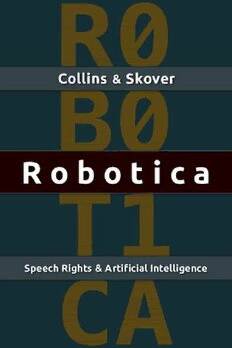Table Of Contentrobotica
In every era of communications technology – whether print, radio, television, or
Internet–someformofgovernmentcensorshipfollowstoregulatethemediumandits
messages.Todayweareseeingthephenomenonof“machinespeech”enhancedbythe
development of sophisticated artificial intelligence. Ronald K. L. Collins and David
M. Skover argue that the First Amendment must provide defenses and justifications
forcoveringandprotectingroboticexpression.Itisirrelevantthatarobotisnothuman
and cannot have intentions; what matters is that a human experiences robotic speech
as meaningful. This is the constitutional recognition of “intentionless free speech” at
the interface of the robot and receiver. Robotica is the first book to develop the legal
arguments forthese purposes.Aimed at lawand communication scholars,lawyers, and
free speech activists, this work explores important new problems and solutions at the
interfaceoflawandtechnology.
ronald k. l. collins is the Harold S. Shefelman Distinguished Scholar at the
UniversityofWashingtonSchoolofLaw.
david m. skover is the Fredric C. Tausend Professor of Constitutional Law at
SeattleUniversitySchoolofLaw.
Robotica
speech rights and artificial intelligence
RONALD K. L. COLLINS
University of Washington
DAVID M. SKOVER
Seattle University
UniversityPrintingHouse,Cambridgecb28bs,UnitedKingdom
OneLibertyPlaza,20thFloor,NewYork,ny10006,USA
477WilliamstownRoad,PortMelbourne,vic3207,Australia
314–321,3rdFloor,Plot3,SplendorForum,JasolaDistrictCentre,NewDelhi–110025,India
79AnsonRoad,#06–04/06,Singapore079906
CambridgeUniversityPressispartoftheUniversityofCambridge.
ItfurtherstheUniversity’smissionbydisseminatingknowledgeinthepursuitof
education,learning,andresearchatthehighestinternationallevelsofexcellence.
www.cambridge.org
Informationonthistitle:www.cambridge.org/9781108428064
doi:10.1017/9781108649445
©RonaldK.L.CollinsandDavidM.Skover2018
Thispublicationisincopyright.Subjecttostatutoryexception
andtotheprovisionsofrelevantcollectivelicensingagreements,
noreproductionofanypartmaytakeplacewithoutthewritten
permissionofCambridgeUniversityPress.
Firstpublished2018
PrintedintheUnitedStatesofAmericabySheridanBooks,Inc.
AcataloguerecordforthispublicationisavailablefromtheBritishLibrary.
isbn978-1-108-42806-4Hardback
isbn978-1-108-44871-0Paperback
CambridgeUniversityPresshasnoresponsibilityforthepersistenceoraccuracy
ofURLsforexternalorthird-partyinternetwebsitesreferredtointhispublication
anddoesnotguaranteethatanycontentonsuchwebsitesis,orwillremain,
accurateorappropriate.
Contents
About the Authors page vii
About the Commentators ix
Acknowledgments xi
the thesis 1
Prologue: Technology and Communication 3
Part I TheProgressand Perils ofCommunication 6
Part II Robots and Their Receivers 32
Part III The New Norm of Utility 48
Epilogue: FromAreopagitica to Robotica 65
the commentaries 69
Robotica in Context: An Introduction tothe Commentaries 71
Ryan Calo
The Age of Sensorship 75
Jane Bambauer
Speech In,Speech Out 85
James Grimmelmann
AnOld Libel Lawyer Confronts Robotica’sBrave New World 94
Bruce E. H.Johnson
v
vi TableofContents
What’sOld IsNew Again(and Vice Versa) 100
Helen Norton
reply 109
Robotica Refined 111
RonaldK. L. Collins andDavidM. Skover
Notes 123
Index 159
About the Authors
Ronald K. L. Collins is the Harold S. Shefelman Scholar at the University of
Washington Law School. Before coming to the law school, Collins served as a
lawclerktoJusticeHansA.LindeontheOregonSupremeCourt,aSupremeCourt
Fellow under Chief Justice Warren Burger, and a scholar at the Washington, DC,
office ofthe Newseum’s First Amendment Center.
Collins has written constitutional briefs that were submitted to the Supreme
Court and various other federal and state high courts. In addition to the books
that he coauthored with David Skover, he is the editor of Oliver Wendell Holmes:
A Free Speech Reader (2010) and coauthor with Sam Chaltain of We Must Not Be
Afraid to Be Free (2011). His last solo book was Nuanced Absolutism: Floyd Abrams
and the First Amendment (2013). Collins is the book editor of SCOTUSblog and
writes a weekly blog (First Amendment News), which appears on the Concurring
Opinions website.
David M. Skover is the Fredric C. Tausend Professor of Constitutional Law at
Seattle University School of Law. He teaches, writes, and lectures in the fields of
federal constitutional law, federal jurisdiction, and mass communications theory
andthe First Amendment.
SkovergraduatedfromtheWoodrowWilsonSchoolofInternationalandDomes-
tic Affairs at Princeton University. He received his law degree from Yale Law
School, where he was an editor of the Yale Law Journal. Thereafter, he served as
alawclerkforJudgeJonO.NewmanattheFederalDistrictCourtfortheDistrictof
ConnecticutandtheUSCourtofAppealsfortheSecondCircuit.Inadditiontothe
booksthathecoauthoredwithRonaldCollins,heisthecoauthorwithPierreSchlag
ofTactics of LegalReasoning (1986).
Together, Collins and Skover have authored The Death of Discourse (1996 and
2005), The Trials of Lenny Bruce: The Fall & Rise of an American Icon (2002 and
vii
viii AbouttheAuthors
2012),Mania:TheOutraged&OutrageousLivesThatLaunchedaCulturalRevolu-
tion (2013), On Dissent: Its Meaning in America (2013), When Money Speaks: The
McCutcheon Decision, Campaign Finance Laws, and the First Amendment (2014),
andTheJudge:26MachiavellianLessons(2017).Theyhavealsocoauthorednumer-
ous scholarly articles in various journals including the Harvard Law Review, Stan-
ford Law Review, Michigan Law Review, and the Supreme Court Review, among
other publications. The Trials of Lenny Bruce (revised and expanded) and Mania,
On Dissent, When MoneySpeaksandThe Judge are available in e-book form.
About the Commentators
JaneBambauerisaProfessorofLawattheUniversityofArizona’sJamesE.Rogers
College ofLaw. Her research assessesthe social costs andbenefits ofBig Data and
questions the wisdom of many well-intentioned privacy laws. Her articles have
appeared in the Stanford Law Review, Michigan Law Review, California Law
Review, and the Journal of Empirical Legal Studies. Professor Bambauer’s own
data-driven research explores biased judgment, legal education, and legal careers.
SheholdsaBSinmathematicsfromYaleCollegeandaJDfromYaleLawSchool.
Ryan Calo is the Lane Powell and D. Wayne Gittinger Associate Professor of Law
at the University of Washington. He is a faculty codirector of the University of
Washington Tech Policy Lab, a unique, interdisciplinary research unit that spans
the School of Law, Information School, and Paul G. Allen School of Computer
Science and Engineering. Professor Calo holds courtesy appointments at the Uni-
versity of Washington Information School and the Oregon State UniversitySchool
of Mechanical, Industrial, and Manufacturing Engineering. His research on law
and emerging technology appears in leading law reviews (California Law Review,
University of Chicago Law Review, and Columbia Law Review) and technical
publications (Nature, Artificial Intelligence) and is frequently referenced by the
mainstream media(New YorkTimes, Wall Street Journal).
JamesGrimmelmannisaprofessoratCornellTechandCornellLawSchool.His
researchfocusesonhowlawsregulatingsoftwareaffectfreedom,wealth,andpower.
He helps lawyers and technologists understand each other and writes about digital
copyright,searchengines,privacyonsocialnetworks,onlinegovernance,andother
topics incomputerandInternetlaw.He is the author orcoauthorofInternet Law:
Cases and Problems (7th edn., 2017) and two other casebooks, multiple amicus
briefs, more than forty scholarly articles, andnumerous op-eds and essays.
ix

